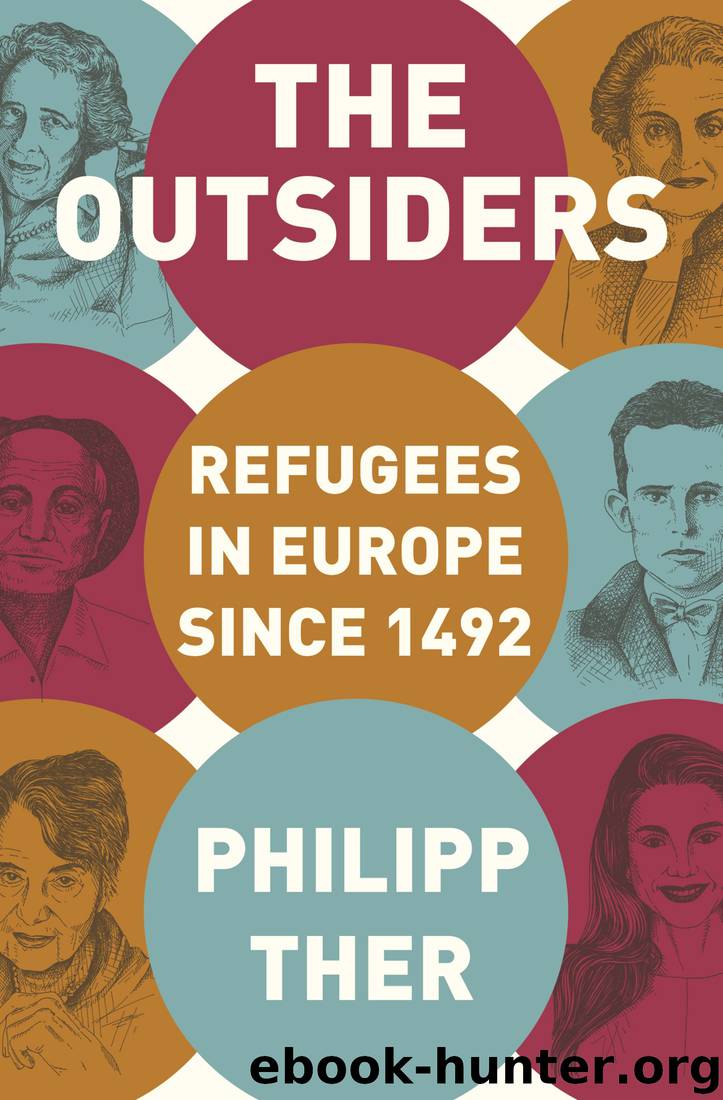The Outsiders: Refugees in Europe Since 1492 by Philipp Ther

Author:Philipp Ther [Ther, Philipp]
Language: eng
Format: epub
Tags: Emigration & Immigration, Europe, History, Refugees, Social History, Social Science
ISBN: 0691179522
Google: JteaDwAAQBAJ
Amazon: 0691179522
Publisher: Princeton University Press
Published: 2019-11-26T03:00:00+00:00
After the Second World War, Paris emerged once again as the intellectual epicenter for exiled Poles, while the government-in-exile, reduced to insignificance, remained in London. This stature was attributable above all to the Instytut Literacki (Literary Institute) in Paris and its publication Kultura. That journal’s central personality was the former government official, journalist, and world war veteran Jerzy Giedroyc. Yet Kultura functioned above all as a collaborative publishing venture and authors’ collective. The Parisian journal published different genres of literature: poetry (including numerous poems by Władysława Szymborska, who later joined Czesław Miłosz as a recipient of the Noble Prize for literature), political essays that ranked among the masterpieces of this genre, memoirs, short stories, and excerpts from novels. This meant that every issue of this literary and cultural review was varied in design. There was no comparable German-language publication in the postwar period; the closest equivalent in the United States was the New York Review of Books (which was established in 1963 and at times also provided a forum for and about refugee and dissident intellectuals from Central and Eastern Europe). Kultura printed, in addition to the works of exiles, numerous Polish authors who had remained in their homeland and were banned or heavily censored there, including the beatnik Marek Hłasko, who wrote the most exciting books of the 1950s and 1960s, as well as the dramatists Zbigniew Herbert and Sławomir Mrożek. Also appearing in the magazine were translations of the Russian authors Boris Pasternak, Anna Akhmatova, and Alexander Solzhenitsyn. In this way Kultura shaped intellectual and cultural life both in exile and in Poland.
The political significance of Kultura was much greater than one might anticipate for a cultural journal. It softened the sometimes stubborn anti-Communism that shaped all of the East European diasporas (which led to conflicts in the case of Miłosz and contributed to his 1953 departure for the US), functioned as a channel of communication for international and national opposition to the Communist government in Poland, and promoted reconciliation with the Ukraine, Belarus, and Lithuania. Jerzy Giedroyc and his allies were of the opinion that Poland needed to take leave for good of its lost eastern territories and abandon any claims to cultural hegemony in order to put relations with its eastern neighbors on a new footing. This insight is all the more remarkable in that it was held by exiles who, like Miłosz and Jerzy Stempowski, came from these very regions. They were thus giving up on their old homelands, a painful step that only a few German expellees took so decisively and so early. Kultura supported the Ukrainian, Lithuanian, and Belarusian independence movements, regularly printed texts by authors from these Soviet republics, and thus anticipated Polish and European foreign policy as it took shape in the 1990s. Alongside Kultura, the Literary Institute also put out Zeszyty Historyczne, an influential historical journal that treated Poland’s conflicts with its neighbors and Polish-Jewish relations.
Another reason why Poland’s exile community in Paris bloomed so vigorously was that it had an actual brick-and-mortar home, a place that functioned a bit like a beehive.
Download
This site does not store any files on its server. We only index and link to content provided by other sites. Please contact the content providers to delete copyright contents if any and email us, we'll remove relevant links or contents immediately.
Cecilia; Or, Memoirs of an Heiress — Volume 1 by Fanny Burney(32544)
Cecilia; Or, Memoirs of an Heiress — Volume 2 by Fanny Burney(31941)
Cecilia; Or, Memoirs of an Heiress — Volume 3 by Fanny Burney(31928)
The Great Music City by Andrea Baker(31915)
We're Going to Need More Wine by Gabrielle Union(19033)
All the Missing Girls by Megan Miranda(15942)
Pimp by Iceberg Slim(14481)
Bombshells: Glamour Girls of a Lifetime by Sullivan Steve(14050)
For the Love of Europe by Rick Steves(13891)
Talking to Strangers by Malcolm Gladwell(13345)
Norse Mythology by Gaiman Neil(13343)
Fifty Shades Freed by E L James(13231)
Mindhunter: Inside the FBI's Elite Serial Crime Unit by John E. Douglas & Mark Olshaker(9317)
Crazy Rich Asians by Kevin Kwan(9275)
The Lost Art of Listening by Michael P. Nichols(7488)
Enlightenment Now: The Case for Reason, Science, Humanism, and Progress by Steven Pinker(7306)
The Four Agreements by Don Miguel Ruiz(6744)
Bad Blood by John Carreyrou(6610)
Weapons of Math Destruction by Cathy O'Neil(6264)
